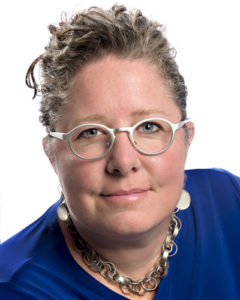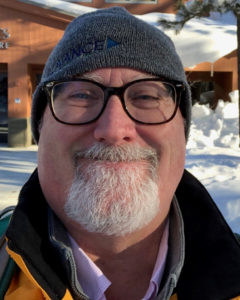Personal and Workplace Success Skills Panel
Monday, November 11, 2019
4:45 PM – 6:15 PM
Preparing adult learners for a digital world requires more than digital literacy skills. Essential interpersonal, intrapersonal, and cognitive problem-solving skills enable us to be resilient, agile, and lifelong learners at work, home, and in our communities in an increasingly complex and ever-changing world. And the good news is that adults can continue to learn, improve, and enhance these skills. Our panelists will share current research, frameworks and resources for designing impactful programs and curriculum.
Panelists:
- Kathleen deLaski, Founder and President of Education Design Lab
- Heather McGowan, Future-of-work Strategist
- Michelle Weise, Senior VP, Workforce Strategies, Strada Institute for the Future of Work
- Frank Gerdeman, Adult Education Programs Consultant, New World of Work
Kathleen deLaski founded the Education Design Lab after eight years on the Board of Virginia’s largest public university, George Mason. A social entrepreneur, she has launched or co-launched four non-profits in the past two decades, all related to improving the quality of education for non-elite students. With the Lab, she saw the need for a non-profit to help learning institutions and other players design education toward the future of a fast changing world. As the Lab has supported some 60 universities, as well as employers and high schools, in their innovation design work, Kathleen has been asked to share learnings and ideas about the broken pipeline, 21st century skills and the learner-driven revolution around the world.
In addition, Kathleen serves as the president of the deLaski Family Foundation, a leading grantmaker in education reform and new pathways to the middle class. She founded and serves as board chair for EdFuel, a national non-profit working to build a diverse talent leadership pipeline for K-12 education. Previously, Kathleen created Sallie Mae’s award-winning college access foundation, co-founded Building Hope, a charter school facilities financing non-profit and helped Michelle Rhee create StudentsFirst, a national advocacy movement to improve school options and quality.
Spending five years at America Online, she developed the first interactive tools to engage the public online in elections and the political process and helped the biggest news organizations create digital brands. She and her boss, Steve Case, were named by Harvard University’s Institute of Politics among “25 People Changing the World.” Kathleen was named by President Clinton as Chief Spokesman for the Pentagon, where she oversaw the military’s worldwide public information team. She also spent 13 years as a TV journalist, including 5 years as an ABC News Washington correspondent.
Future-of-work strategist Heather E. McGowan helps leaders prepare their people and organizations for the Fourth Industrial Revolution. The Third Industrial Revolution was marked by computerization and automation of physical labor, laying the foundation for the Fourth Industrial Revolution, which will be notable for the rapid advancement of technology tools into the domain of human knowledge work. In this world, humans must continuously learn and adapt, and with this transition comes information overload. Heather gives lucidity to this topic through her illuminating graphic frameworks and powerful metaphors, all backed by deep research. In 2017, LinkedIn ranked her as its number one global voice for education. Pulitzer Prize–winning NYT columnist Thomas Friedman frequently quotes Heather in his books and columns and describes her as “the oasis” when it comes to insights into the future of work. Heather’s sessions help employees and leaders alike prepare for and adapt to jobs that do not yet exist.
McGowan’s clients range from start-ups to publicly traded Fortune 500 companies, including AMP Financial, Autodesk, Biogen, Citi, Accor Hotels, AARP, The World Bank, and BD Medical. Often quoted in the media, notably in the New York Times, McGowan serves on the advisory board for Sparks & Honey, a New York–based culture-focused agency looking to the future for brands. McGowan’s academic work has included roles at Rhode Island School of Design, Becker College, and Jefferson University, where she was the strategic architect of the first undergraduate college focused exclusively on innovation. Heather advises and gives keynote addresses for organizations all over the world and, with her colleagues, provides bespoke consulting to help organizations adapt to the Fourth Industrial Revolution. Her think tank is called Work to Learn because McGowan believes that in the Third Industrial Revolution, we learned (once) in order to work and now, in the Fourth Industrial Revolution, we will work in order to learn (continuously). McGowan is the co-editor and author of the book Disrupt Together: How Teams Consistently Innovate and a Forbes contributor. She is working on her latest book on the future of work, due out by Wiley in spring 2020.

Michelle R. Weise is Strada Education Network’s Senior Vice President of Workforce Strategies and serves as Chief Innovation Officer for the Strada Institute for the Future of Work, which is dedicated to advancing understanding of the future of learning and work to build the learning ecosystem of the future.
Weise’s research focuses on the future of the workforce and how to connect learners more directly to meaningful employment pathways throughout their working lives. She is a senior adviser to Entangled Solutions and serves on the Commission on Digital Innovation and Lifelong Learning for Massachusetts Gov. Charlie Baker, the Commission on the Future of Higher Education for the American Academy of Arts and Sciences, and the education advisory board for Village Capital.
Before joining Strada, she designed and led the Sandbox ColLABorative, the innovation lab of Southern New Hampshire University. Earlier in her career, Weise was the senior research fellow in higher education at the Clayton Christensen Institute for Disruptive Innovation, vice president of academic affairs at Fidelis Education, and taught at Skidmore College and Stanford University.
Her book, Hire Education: Mastery, Modularization, and the Workforce Revolution, co-authored with Christensen, describes the disruptive potential of online competency-based education aligned to workforce needs. Weise’s commentaries and research have been featured in The Economist, The Wall Street Journal, Harvard Business Review, Bloomberg Businessweek, The Boston Globe, Inside HigherEd, The Chronicle of Higher Education, and PBS Newshour.
She is a former Fulbright Scholar and graduate of Harvard University and Stanford University.
Frank Gerdeman currently serves as the Adult Education Programs Consultant for New World of Work, which is headquartered at Shasta College in northern California and dedicated to collaborating with educators, employers, workforce development boards and research organizations to build college/career ready employability skills. His full-time, “day” job is as the Director of Advance (serving the southern region of the Lake Tahoe Basin in California and Nevada) where they are building a fully-integrated education and workforce system from the ground up. Frank has been involved with formal adult education for over 15 years in a variety of positions – basic skills instructor, learning center coordinator and deputy regional manager of the largest program in Vermont. Prior to moving to South Lake Tahoe, he served as the State Director of Adult Education and Deputy Division Director with the Vermont Agency of Education where his duties included oversight of Adult Education, Career and Technical Education, Assessment, Title III (NCLB), and School Improvement. At various times throughout his career Frank has also served on a number of regional and national workgroups in the areas of adult education, assessment, and workforce development.


